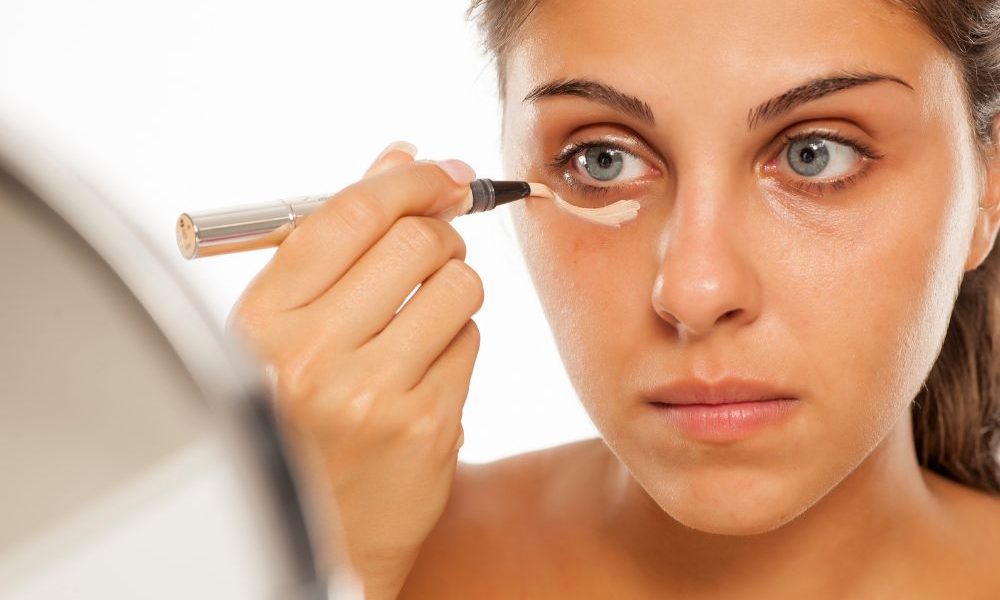Concealing dark circles and blemishes can make a significant difference in your overall appearance, boosting your confidence and helping you put your best face forward. With the right techniques and products, you can achieve a flawless, natural-looking complexion. Here’s a comprehensive guide to effectively concealing dark circles and blemishes.
Understanding the Basics of Concealer
“Concealer is like Photoshop for your face. It can erase imperfections and give you a flawless complexion.” – Wayne Goss, Makeup Artist
Types of Concealer
- Liquid Concealer: Versatile and suitable for most skin types. Offers buildable coverage and is ideal for under-eye circles and general blemishes.
- Cream Concealer: Provides fuller coverage and is excellent for covering blemishes, dark circles, and discoloration.
- Stick Concealer: Easy to apply and perfect for on-the-go touch-ups. Best for covering small blemishes and minor imperfections.
Choosing the Right Shade
“The key to concealing blemishes is to use a concealer that matches your skin tone exactly. Avoid using a shade that is too light or too dark, as this will only draw attention to the blemish.” – Val Garland, Makeup Artist
- Dark Circles: Choose a concealer that is one to two shades lighter than your skin tone to brighten the under-eye area.
- Blemishes: Match the concealer to your exact skin tone to avoid highlighting the blemish.
Step-by-Step Guide to Concealing Dark Circles
Step 1: Prep Your Skin
Start with a clean, moisturized face. Apply an eye cream to hydrate the under-eye area and create a smooth base for the concealer.
Personal Anecdote: I used to skip eye cream, but incorporating it into my routine has made a huge difference in how my concealer looks and lasts. My under-eyes stay hydrated and smooth, which helps the concealer blend seamlessly.
Step 2: Apply Color Corrector (If Needed)
For severe dark circles, use a color corrector before applying concealer. Peach or salmon correctors work well for blue or purple undertones, while yellow correctors can neutralize brown tones.
Step 3: Apply Concealer
“When it comes to concealing dark circles, less is more. Start with a small amount of product and build up gradually to avoid a cakey look.” – Pat McGrath, Makeup Artist
Dot the concealer under your eyes, focusing on the inner corners where dark circles are usually the darkest. Blend gently with your ring finger, a makeup sponge, or a brush.
Step 4: Blend
Use a damp makeup sponge or a concealer brush to blend the concealer seamlessly into your skin. Be gentle to avoid tugging on the delicate under-eye area.
Step 5: Set with Powder
“Don’t forget to set your concealer with powder. This will help it to stay in place all day and prevent it from creasing.” – Laura Mercier, Makeup Artist and Founder of Laura Mercier Cosmetics
Lightly dust a translucent setting powder over the concealer to lock it in place. Use a small, fluffy brush for precise application.
Step-by-Step Guide to Concealing Blemishes
Step 1: Prep Your Skin
Cleanse and moisturize your face before applying makeup. A smooth, hydrated base ensures better makeup application and longevity.
Step 2: Apply Color Corrector (If Needed)
For redness, use a green color corrector to neutralize the color before applying concealer.
Step 3: Apply Concealer
Dot the concealer directly onto the blemish using a clean fingertip, a brush, or the concealer applicator. Choose a concealer that matches your skin tone exactly.
Step 4: Blend
Gently blend the edges of the concealer with a clean brush or sponge. Avoid blending too much over the blemish itself to maintain coverage.
Step 5: Set with Powder
Lightly dust translucent setting powder over the concealed area to ensure it stays put throughout the day.
Tips for Choosing the Right Products
Formula Matters
Different concealer formulas work better for different skin types and concerns. Liquid concealers are generally more hydrating and blendable, making them ideal for under-eye circles. Cream and stick concealers offer fuller coverage, perfect for blemishes and discoloration.
Hydrating Concealers
“If you have dry under-eyes, opt for a hydrating concealer formula. This will prevent the concealer from settling into fine lines and making them more noticeable.” – Bobbi Brown, Makeup Artist and Founder of Jones Road Beauty
Setting Powder
Choose a finely milled translucent powder to set your concealer. This helps prevent creasing and keeps your makeup looking fresh all day.
Common Mistakes to Avoid
Using Too Much Product
Using too much concealer can lead to a cakey appearance. Start with a small amount and build up coverage as needed.
Not Blending Properly
Improper blending can make the concealer stand out, drawing more attention to the areas you’re trying to conceal. Take your time to blend the edges seamlessly into your skin.
Skipping Primer
Using a primer can help create a smooth base for your makeup, improving the application and longevity of your concealer.
Ignoring Skin Care
Proper skin care is crucial for achieving a flawless makeup look. Make sure to cleanse, exfoliate, and moisturize regularly to keep your skin in top condition.
Personal Insights and Experiences
I’ve struggled with dark circles and occasional blemishes for years, and finding the right concealer routine has been a game-changer. One of my favorite discoveries is using a peach color corrector under my concealer for dark circles. It neutralizes the blue tones perfectly and makes my eyes look much brighter. Additionally, investing in a good setting powder has helped my makeup stay put all day, even through long work hours.
Conclusion
Concealing dark circles and blemishes effectively is all about understanding your skin and using the right techniques and products. With a bit of practice, you can achieve a flawless, natural-looking complexion that boosts your confidence and enhances your beauty. Remember, less is more, and blending is key to a seamless finish.
By following these tips and tricks, you can master the art of concealing imperfections and enjoy a radiant, even complexion every day.

